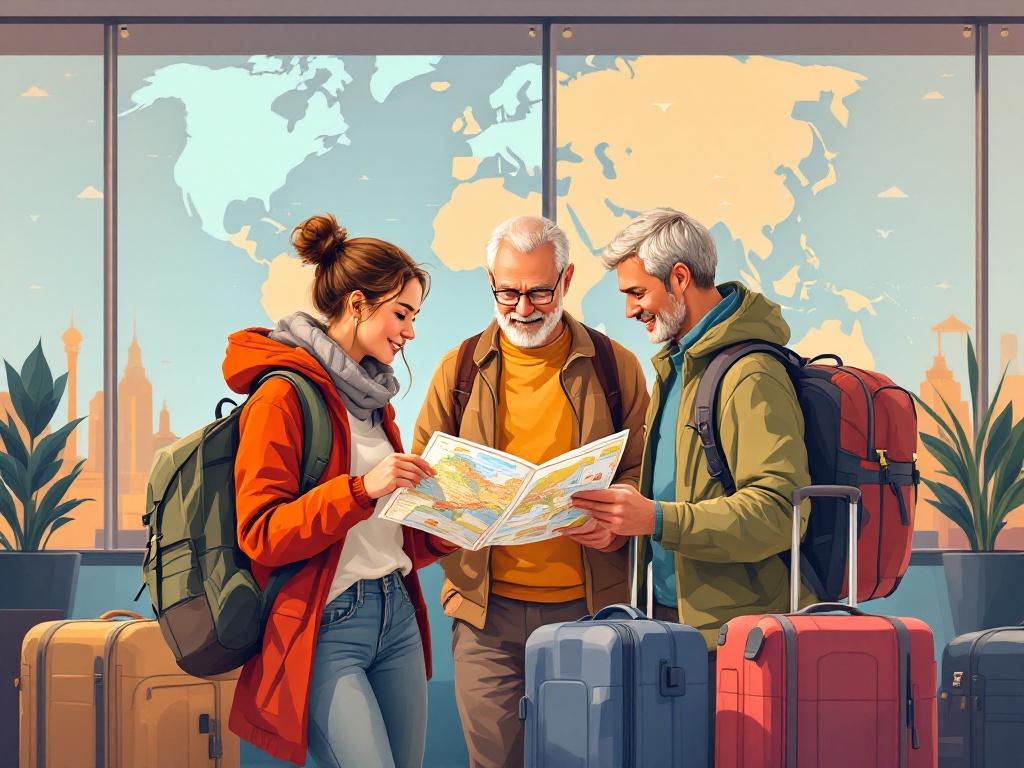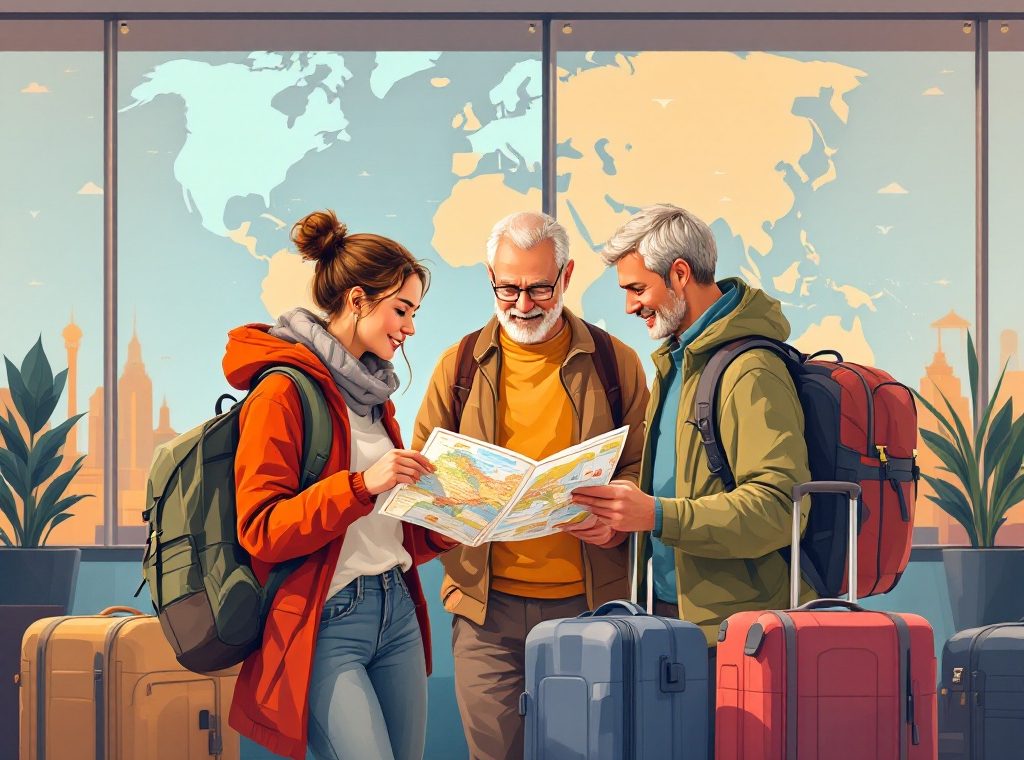Staying Safe Abroad: Tips for a Safe Trip
Planning a trip abroad? Don’t let safety concerns overshadow your adventure! This guide provides essential tips for a secure and enjoyable international journey. Learn how to research local customs, pre-plan transportation, protect your belongings, and manage emergencies. Discover specific advice for solo travelers, women, older adults, and those venturing into high-risk areas. Start planning your safe trip today!
Important information

- Research your destination: Learn about local laws, customs, and safety concerns. Check government websites for travel advisories and consider enrolling in a traveler safety program.
- Plan transportation: Pre-book airport transfers and local commutes. Use reputable services and aim to arrive during daylight hours for easier navigation.
- Protect your information: Make copies of important documents and store them separately from originals. Use a VPN on public Wi-Fi and be cautious with your belongings.
- Stay safe and healthy: Share your itinerary with someone you trust. Be aware of your surroundings, watch your drinks, and avoid drawing unnecessary attention.
- Prepare for emergencies: Have a safety plan with emergency contacts. Get travel insurance that covers medical emergencies, evacuations, and trip disruptions.
Understanding Traveler Safety: Essential Tips for a Secure Trip Abroad
Prioritize safety by learning local customs and researching cultural etiquette.
Understand legal restrictions to prevent issues.
Arrive during daylight hours for better visibility and easier navigation, especially in unfamiliar locations.
Pre-plan transportation using pre-booked services or reliable public transit to enhance your safety.
How to Plan for Safe International Travel
Traveling internationally requires careful planning. Before you go, research the local laws and customs of your destination. Be aware of any safety concerns and check government websites for travel advisories. Consider enrolling in a traveler safety program. Pre-plan your transportation from the airport to your accommodation and for getting around locally. This will make your arrival smoother and minimize the risks of using unfamiliar transport systems, especially if you arrive at night. Whenever possible, arrive during daylight hours to make it easier to find your way around, especially in unfamiliar areas. Arriving during the day also gives you enough time to get to your accommodation before dark. Here’s a step-by-step guide to help you prepare:
Research local laws and customs. Be aware of any potential safety concerns.
Check government websites for travel advisories. Consider enrolling in a traveler safety program.
Pre-plan your transportation. Arrange airport transfers and local commutes in advance.
Arrive during daylight hours. This makes navigation easier, especially in unfamiliar places, and gives you time to reach your accommodation before dark.
Managing Travel Documents and Communication
Before embarking on your trip, take the time to photocopy crucial documents such as your passport, visa, driver’s license, and travel insurance policy. Store these copies separately from your original documents and leave a set with a trusted friend or family member. Notify your bank and credit card companies of your travel dates and destinations to avoid any issues with your cards while abroad. For payments, carry a mix of credit cards, debit cards, and local currency to ensure you have options in various situations. Keep emergency contact information readily accessible, and share your itinerary with a trusted individual, providing them with regular updates on your location. While international roaming can be convenient, consider purchasing a local SIM card upon arrival for more cost-effective communication. Download essential communication apps and a VPN for secure internet access while traveling.
Protecting Your Personal Information and Belongings
Conceal your valuables. Secure wallets, passports, and phones out of sight to deter theft.
Be discreet with expensive items. Avoid openly displaying jewelry or electronics that may attract unwanted attention.
Use a VPN on public Wi-Fi. Protect your online activity by using a Virtual Private Network (VPN) on public Wi-Fi networks.
Separate your cash and cards. Divide your money and credit cards into different locations to minimize potential loss.
Stay alert. Maintain awareness of your surroundings at all times to prevent theft or loss.
Maximizing Lodging Safety and Security
Enhance your hotel stay security with these simple steps:
Use the provided lock and deadbolt on your door.
Consider using a portable door jammer for added security.
Ensure all windows are securely closed.
Use the “Do Not Disturb” sign and keep your curtains drawn for privacy.
Verify the identity of anyone claiming to be hotel staff with the front desk before opening your door.
Report any suspicious activity to hotel staff immediately.
Maintaining Health and Personal Safety Abroad
Share your itinerary and location updates with loved ones to keep them informed of your whereabouts. Research local customs and laws beforehand to avoid unintentional problems.
Safeguard your drinks by never leaving them unattended and accepting them only from trusted sources. If you leave your drink unattended, get a new one upon returning, even if it was only for a moment.
Maintain a low profile by avoiding ostentatious displays of valuables such as jewelry or electronics. Refrain from walking alone at night, especially in unfamiliar or dimly lit areas.
Try to blend in with the local environment to avoid being targeted by criminals. This can help ensure a safer and more enjoyable travel experience.
Preparing for Emergencies and Unexpected Situations
Develop a comprehensive safety plan. This should include a list of emergency contacts, both at home and local emergency services.
Locate your embassy and keep their contact information readily available.
Familiarize yourself with local laws and customs.
Maintain regular contact with friends and family back home, and check in with your embassy periodically.
Secure comprehensive travel insurance that covers medical emergencies, evacuations, and any potential trip disruptions.
Special Considerations for Different Traveler Groups
Share your itinerary with a trusted contact. Inform a friend or family member about your travel plans, especially when traveling solo.
Stay in well-lit and populated areas. Prioritize safety by choosing accommodations and routes in well-lit and populated areas.
Consider carrying a personal safety alarm. A personal safety alarm can provide an added layer of security.
Explore women-only options (for solo female travelers). Women traveling alone might consider women-only accommodations or tours for increased comfort and safety.
Consult your doctor (for older travelers). Older travelers should consult their doctor regarding necessary vaccinations and medications before traveling.
Register with your embassy (for high-risk regions). If venturing into higher-risk regions, register with your embassy or consulate.
Maintain a low profile and respect local customs. Respect local laws and customs and maintain a low profile, especially in higher-risk areas.
Understanding Travel Safety Tips for Specific Activities
Adventure Travel
Adventure travel offers exhilarating experiences, but it’s crucial to acknowledge the inherent risks in activities like hiking, climbing, and exploring remote locations. Thorough research on potential dangers and necessary precautions is essential. Consider hiring certified guides and packing appropriate safety gear. Always share your itinerary and check in regularly with someone back home.
- Research potential dangers and necessary precautions.
- Hire certified guides.
- Pack appropriate safety gear.
- Share your itinerary.
- Check in regularly with someone back home.
Driving in a Foreign Country
Driving in a foreign country presents its own set of challenges, from navigating unfamiliar road signs to understanding different traffic laws. Obtain an international driving permit if required, and familiarize yourself with local regulations and road conditions. Choose reputable car rental agencies and ensure adequate insurance coverage for your vehicle.
- Obtain an international driving permit if required.
- Familiarize yourself with local regulations and road conditions.
- Choose reputable car rental agencies.
- Ensure adequate insurance coverage.
Water Activities
Water activities, while fun, can be hazardous. Be mindful of water safety guidelines and potential dangers like strong currents and riptides. Swim only in designated areas, never alone, and always wear a life jacket for water sports. Proper training and necessary safety equipment are also vital.
- Be mindful of water safety guidelines and potential dangers.
- Swim only in designated areas and never alone.
- Always wear a life jacket for water sports.
- Ensure proper training and necessary safety equipment.














